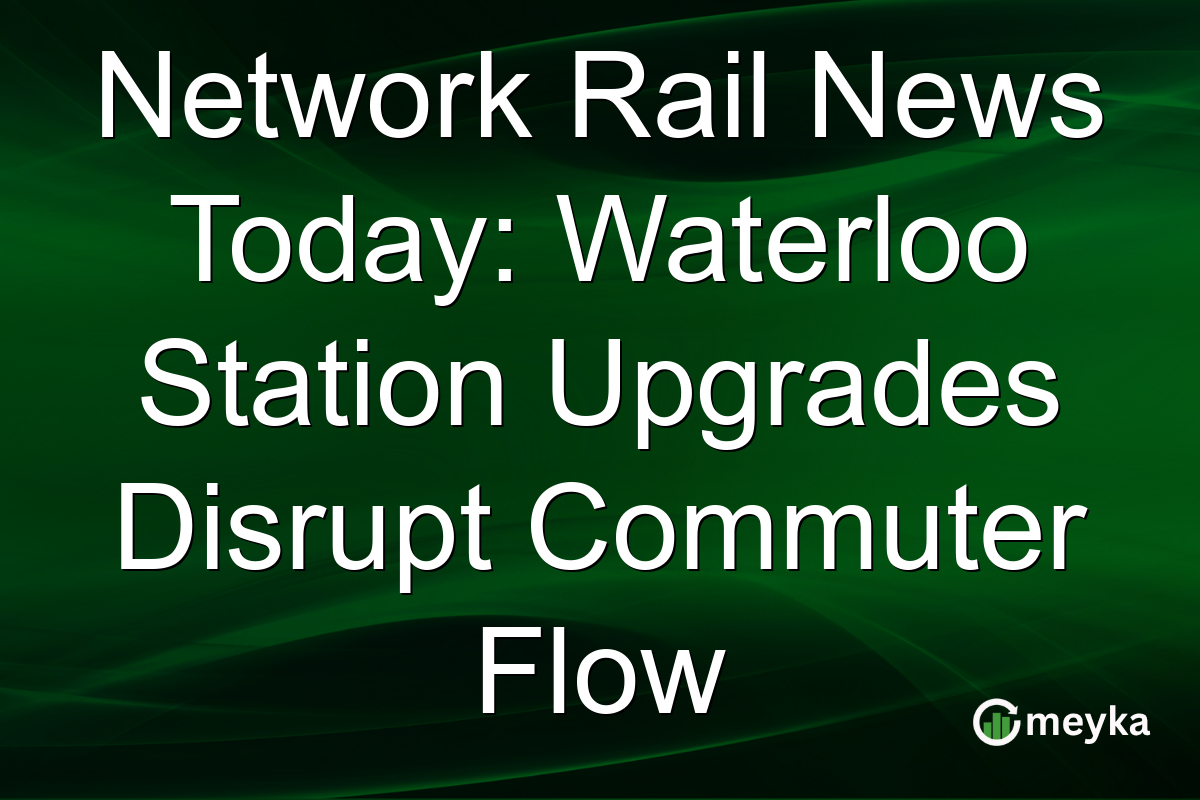Network Rail News Today: Waterloo Station Upgrades Disrupt Commuter Flow
Today, London’s bustling Waterloo Station is at the center of attention due to major upgrade works by Network Rail. These crucial enhancements have resulted in significant disruptions, impacting thousands of commuters. The effects on business operations and the regional economy are profound and far-reaching, drawing wide concern among city firms and daily travelers. Let’s explore how these changes are unfolding and what they mean for London’s infrastructure and daily rhythm.
Impact of Waterloo Station Upgrades on Commuters
The ongoing Waterloo Station upgrades are part of an ambitious project by Network Rail to modernize critical infrastructure. This endeavor aims to improve overall service quality but has led to considerable commuter rail disruptions. Thousands of business travelers, including financial workers who rely on timely train services, are experiencing delays and cancellations. Commuters have faced significant challenges, such as long waiting times and overcrowded alternative routes. According to a report by Bloomberg, these disturbances have sparked frustration among daily travelers who depend on these services for work commutes. This surge in delays not only frustrates individuals but also impacts London’s broader transit system, which is one of the busiest in Europe. Though these upgrades promise long-term benefits, the immediate inconvenience cannot be ignored. The disruption highlights the delicate balance between infrastructure development and commuter satisfaction. For the many commuters adversely affected, the journey to a more efficient system is a price they’re reluctantly paying.
Economic Consequences for London’s Regional Economy
The ripple effects of the Waterloo Station upgrades extend well beyond daily travel. They also have significant implications for London’s regional economy. Disruptions at such a central hub impact businesses that rely on timely deliveries and employee punctuality. According to CNBC, many city firms are concerned about the productivity losses associated with these delays. Employees who struggle to reach their offices on time due to prolonged train commutes face challenges maintaining usual work outputs. This scenario creates additional stress on businesses striving to meet deadlines and client expectations, especially in fast-paced sectors such as finance and consulting. Moreover, the retail and hospitality sectors near Waterloo Station report decreased foot traffic, affecting their revenue. The economic cost of these disruptions is still being assessed, but it underscores the vital role that efficient public transport plays in supporting urban economies.
The Role of Network Rail in Managing Upgrades and Delays
Network Rail, responsible for the ongoing upgrades at Waterloo Station, is under substantial pressure to mitigate the negative impacts of these works. The organization aims to complete the upgrades swiftly while ensuring safety and minimal disruption. As Reuters highlights, Network Rail’s management strategy involves communicating effectively with commuters and offering alternative travel routes. This includes real-time updates on delays and potential workarounds, which are crucial for managing commuter expectations. However, the situation calls for further scrutiny as commuters demand quicker solutions. While Network Rail contends that these upgrades are necessary to sustain future growth and efficiency, balancing immediate commuter needs with long-term benefits remains challenging. The organization must continue to adapt its plans to minimize inconvenience and maintain public trust in their timetable.
Looking Ahead: Future Implications of Waterloo Station Upgrades
Once completed, the Waterloo Station upgrades promise to offer enhanced facilities and better service reliability. These improvements are expected to support a growing number of commuters as London’s population and demand for public transport continue to rise. According to industry analyses, future-oriented projects like this one are crucial for keeping up with urban demands and preventing future bottlenecks. The upgrades will likely foster increased economic activity in the area by easing travel logistics for businesses and tourists alike. In the meantime, patience and careful planning are essential. As Network Rail continues its work, both it and London commuters must adapt to temporary changes for the promise of a more efficient and robust rail system. The long-term benefits are expected to outweigh the short-term inconveniences if properly managed and executed.
Final Thoughts
In conclusion, the Waterloo Station upgrades by Network Rail are creating a mixed landscape of challenges and opportunities. While immediate commuter rail disruptions and economic strains are undeniable, the anticipated long-term benefits offer a silver lining. Proper communication and strategic adjustments by Network Rail can help ease the transition, ensuring that the future of London’s rail infrastructure meets the rising demands. For those seeking real-time updates and analysis, platforms like Meyka offer invaluable insights, guiding commuters and businesses through these pressing times.
FAQs
The upgrades have caused significant delays and disruptions, affecting thousands of business travelers and financial workers relying on timely train services.
The disruptions impact productivity for businesses and reduce foot traffic for nearby retail and hospitality sectors, highlighting the critical role public transport plays in urban economies.
Network Rail is implementing communication strategies to update commuters and suggesting alternative routes to manage expectations while working to complete the upgrades efficiently.
Disclaimer:
This is for information only, not financial advice. Always do your research.






